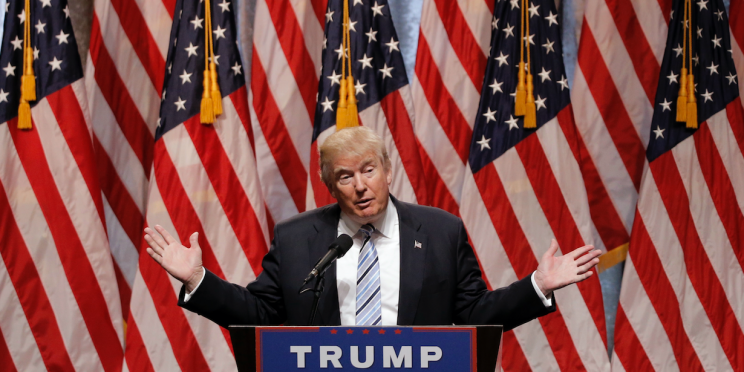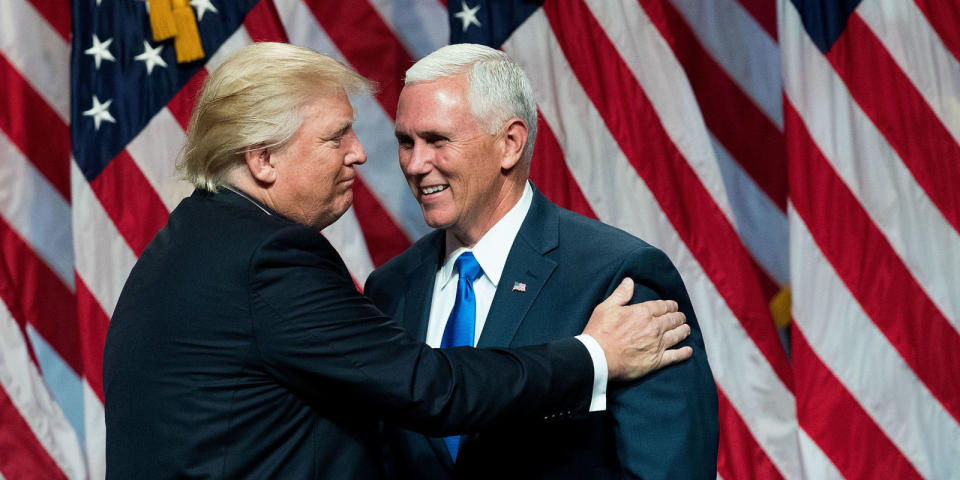Why hedge funds suddenly have to be cautious about donating to Trump

The presumptive Republican presidential candidate Donald Trump may end up having trouble raising money from the deep-pocketed hedge fund and private equity community.
And it won’t be because of his policies or the things he’s said.
Trump, who already trails behind Hillary Clinton in the fundraising arena, selected sitting Indiana Governor Mike Pence as his vice presidential running mate. By doing so, Trump may have limited which asset managers can donate under a relatively new Securities and Exchange Commission rule.
In September 2010, the SEC adopted a new rule, 206(4)-5, to address “pay to play” by restricting campaign donations made by hedge funds and private equity firms. In short, the rule says that fund managers and their employees can’t give money in excess of $250 to $350 to a campaign of a sitting state or local official they might do business with. The rule also applies if that sitting official is running for federal office.
This is actually an extension of a rule that’s been around since 1994 — MSRB rule G-37, which bars broker-dealers who give more than $250 to state or local officials from doing business with them for two years. This rule came about because some bankers were making political contributions and then getting business underwriting municipal bonds.
Here’s how that quid pro quo worked: If a state wanted to build a road, a prison, or a state university, they would finance it with debt. They would need a Wall Street firm to underwrite that business. A lot of the time political contributions granted municipal-bond firms access to that business, so the SEC approved MSRB rule-G-37 to curb these abuses.
The newer SEC rule came out of the Wall Street reform law, Dodd-Frank, and it went into effect in March 2011. And it’s something asset managers and their employees need to pay close attention to because it can impact their business.
Specifically, it comes down to pension plans. Hedge funds and private equity funds manage both state and local governments’ public pension plans. If fund managers give more than $250 to the state and local officials that administer those plans, they’re banned from doing business with those plans or even getting compensation from them for two years.
“A political contribution to a government official that would, under the rule, trigger the two-year time out from providing advice for compensation to the government entity would also trigger a two-year time out from the receipt of compensation for the management of those assets though a covered investment pool. This provision extends the protection of the rule to public pension plans that increasingly access the services of investment advisors,” the rule states.
That’s big business for these funds.

The Indiana Public Retirement System had assets under management of more than $30 billion at the end of 2015. Its 2015 annual report also shows that it has allocations with many hedge funds and private equity firms. It’s also invested with Trump supporters including Wilbur Ross’s distressed-debt firm WL Ross & Co., Stephen Feinberg’s private equity firm Cerberus Capital, and Thomas Barrack Jr.’s real estate private equity firm Colony Capital, the report shows.
To be sure, there’s no retroactive effect with this rule, so there’s no legal issue for anybody who’s already given money so far, political law expert Kenneth Gross, who heads the political law practice at Skadden Arps, told Yahoo Finance in an interview.
That said, this rule could also apply to donating to political action committees (PACs) that support covered candidates.
“You can’t do indirectly what you can’t do directly,” Gross said.
Going forward, folks in the hedge fund and private equity community need to be careful about making donations. It’s not a violation for the campaign. Instead, all of the liability is on the donor side.
“I think it’s actually a bit draconian, the rule, because there’s no proportionality because it was established a strict liability rule,” Gross said.
He explained that if somebody gave $500 or $1000, even if there’s no intent to have influence, they’d still be subject to this ban. There’s also a look-back provision that can be dangerous. An individual who’s donated above the de minimis amount may find it challenging to get a promotion or make a job transfer while that two-year ban is still in effect.
The only way out is through a painful waiver process through the SEC, Gross explained. This involves submitting a full explanation, going through a public proceeding where they ask you a bunch of questions and put you through the ringer. All those are factors that are weighed in a subjective determination that the SEC makes.
It’s one of the reasons Gross has been outspoken about it.
“You don’t want to get tripped up on this one,” he said.
Of course, this rule might not be so bad for hedge funds. Some may be more than happy to say, “I’d love to donate, but I can’t.” It’s practically a built-in excuse for a group that’s constantly being hit up for every political race.
–
Julia La Roche is a finance reporter at Yahoo Finance.
Read more:
Jeffrey Gundlach: ‘Prepare for a Trump presidency’
Warren Buffett nailed why Trump’s businesses failed in a lecture 25 years ago
Wall Street is preparing clients for a Trump presidency
Boone Pickens: I support Trump and his plan to ban unvetted Muslim immigrants
Jon Corzine supports Elizabeth Warren as a Hillary Clinton VP pick

 Yahoo Finance
Yahoo Finance 